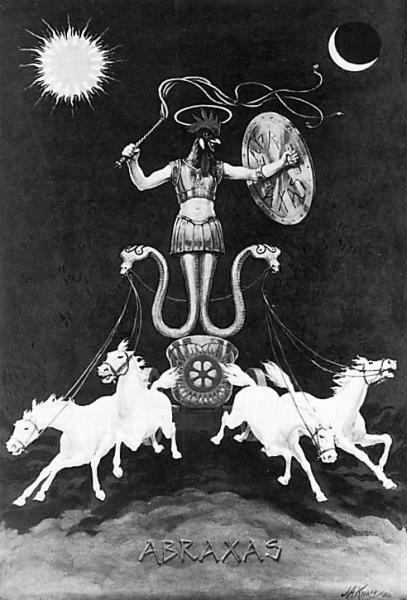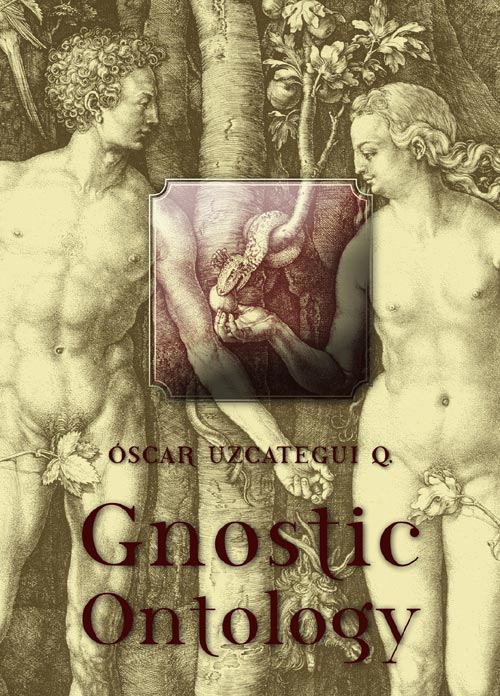The Gnostics were vanquished in their battle with the Christians.
But we can imagine their possible victory. If Alexandria had triumphed
instead of Rome, the bizarre and confused stories that I summarize here
would be coherent, ordinary, majestic”.
Someone characterized it as "the religion of dissatisfied theologian-poets," a description which once would have applied to me [1]. The only thing which has ever really driven me in the direction of atheism is the problem of Job, especially when it became so focused and personal during the AIDS years. Gnosticism is sparked by this problem, too: How can you look at the massive suffering in the world and believe that it was created and is ruled by a God who is omnipotent, benevolent and omniscient?
Gnosticism does not really solve this problem but it certainly alleviates it --at least for dissatisfied theologian-poets. It splits the creator-god of this world from the True God who is utterly beyond and alien to it and then identifies the human trueself with that God. Much reframed mythology ensues.
Gnosticism is not a unitary phenomenon. Given how it locates the process of salvation in the individual human consciousness, that could hardly be otherwise. But one of its distinguishing characteristics is dualism, the splitting of existence into two opposing and incompatible parts. This dualism can be played out on a spectrum, but if you're gonna be a Gnostic, you have to come to terms with it.
In fact, I find Gnostic dualism pretty consoling. It lets you release your pointless and anxious striving to "build the Kingdom of God" in this world by telling you that this world is inherently and essentially un-savable, the broken creation of a flawed and deranged creator.[2] It understands the human condition as a condition, a dilemma, an insoluble predicament in which one finds oneself and which is not of one's own making. Or of Adam's.
The local Gnostic bishop is a quite unusual woman and we became friends. The local run of Gnostics, however, were not unusual at all. As with Jungians, I found that they had a predictable group tendency simply to take their quite circumscribed cultural and political beliefs and project them into Gnosticism. Liberal world-saving Obama-lovers, all. Their religion made them feel even more like special victimized outsiders without having the least dent on their actual do-gooder world-view. Which was, to me, bizarre. Even a standard Jewish conservative like Jonah Goldberg knows for sure that politics is not a redemptive activity.
Anyhow, I got a Gnostic link this morning where yet one more practitioner was urging us to sign on board for yet one more progressive political project to fix the world through expanding the power of the federal government. Head-shaking. I guess I am not the only inconsistent man in the world.
[1] I remain dissatisfied, and something of a theologian, but my sense of poetry is much diminished.
[2] Gnosticism is therefore the precise opposite of what philosopher Eric Voegelin described. In a strand of Rightwing thought, "gnostic" is the term of opprobrium for movements or attitudes which seek "to immanentize the eschaton", to find, through special knowledge, salvation within the structures of this world. Gnosticism certainly claimed special knowledge, but that knowledge was the truth that salvation cannot be found in this world! What he describes is better likened to Islam.



1 comment:
question: Why is the problem of evil suddenly such a huge thing for modern people? Back in the day when there was a plague or something people thought that they were being punished by god because of sin or something. What changed in theology or in the modern mind that suddenly rendered the problem of evil something problematic enough that it challenges massive portions of the population ability to believe in God? Personally, I think it is specifically because of the triumph of liberalism that has reduced Christianity to a theraputic-deism.
Post a Comment